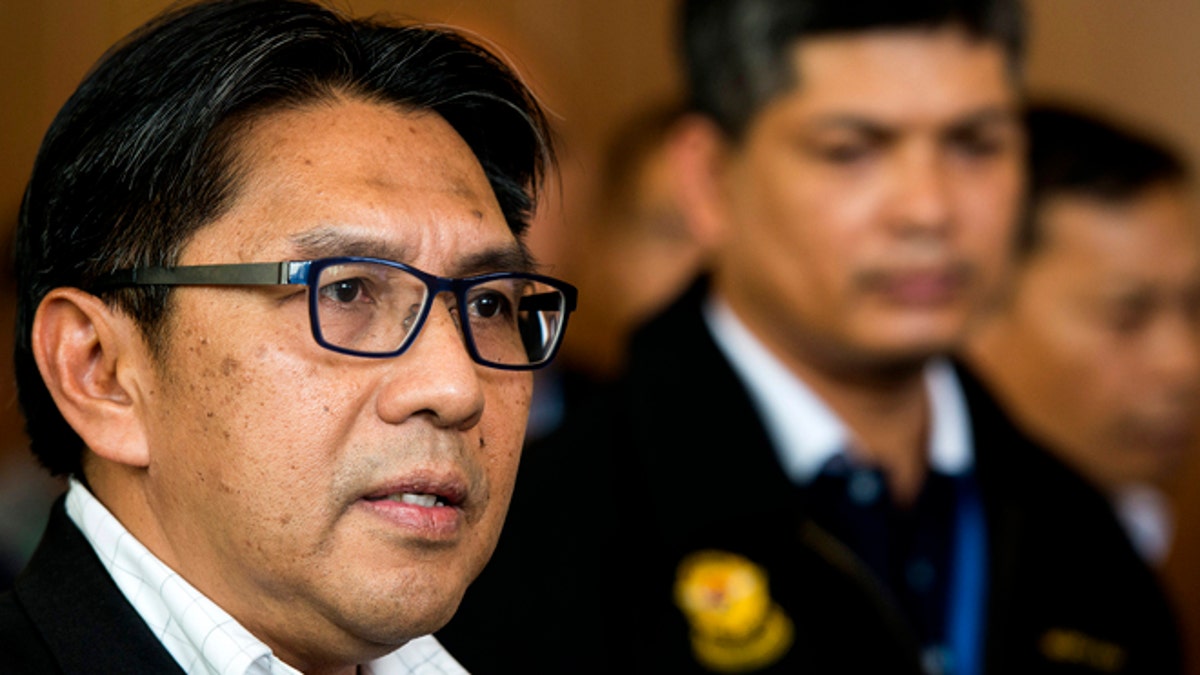
April 2, 2014: Malaysia's civil aviation chief Azharuddin Abdul Rahman, left, is accompanied by an unidentified Malaysia Airlines official while answering questions during a press conference after a close door meeting with Chinese relatives of the passengers onboard the missing Malaysia Airlines Flight 370 at a hotel in Bangi, on the outskirts of Kuala Lumpur, Malaysia. (AP)
Malaysian authorities on Thursday released a report on the investigation into the disappearance of Flight 370, which revealed that air traffic controllers did not realize that the plane was missing until 17 minutes after it vanished from radar.
The release of the report came as Malaysia Airlines told relatives of passengers who were aboard MH370 to move back home and wait for news on the search for the missing plane.
Since the Boeing 777 disappeared on March 8, the airline has been putting the relatives up in hotels, where they've been briefed on the search. But the airline said in a statement Thursday that it would close its family assistance centers around the world by May 7, and that the families should receive search updates from "the comfort of their own homes."
The airline said that it would establish family support centers in Kuala Lumpur and Beijing, and that it would keep in close touch with the relatives through phone calls and meetings.
Malaysia Airlines also said it would soon make advanced compensation payments to the relatives.
The plane went off Malaysian radar at 1:21 a.m. on March 8, but Vietnamese air traffic controllers only queried about it at 1:38 a.m., according to the report, which was sent last month to the International Civil Aviation Organization.
The report, which was dated April 9 and posted on the Facebook page of Malaysian Transport Minister Hishammuddin Hussein, also noted that authorities waited four hours after receiving the last contact from the plane before starting a search-and-rescue operation.
That report showed that Malaysia Airlines at one point thought the plane may have entered Cambodian airspace. The airline said in the report that "MH370 was able to exchange signals with the flight and flying in Cambodian airspace," but that Cambodian authorities said they had no information or contact with Flight 370. It was unclear which flight it was referring to that exchanged signals with MH370.
Malaysian Prime Minister Najib Razak last week appointed a team of experts to review all the information the government had regarding the missing plane, and to decide which information should be made public
"The prime minister set, as a guiding principle, the rule that as long as the release of a particular piece of information does not hamper the investigation or the search operation, in the interests of openness and transparency, the information should be made public," Hussein said in a statement Thursday.
The report also called for the International Civil Aviation Organization to explore the safety benefits of introducing real time tracking of commercial aircraft.
“While commercial air transport aircraft spend considerable amounts of time operating over remote areas, there is currently no requirement for real time tracking of these aircraft,” the report states. “There have now been two occasions during the last five years where large commercial air transport aircraft have gone missing and their last position was not accurately known.”
The plane vanished during a flight from Kuala Lumpur to Beijing, and most of the passengers were Chinese.
No wreckage from the plane has been found, and an aerial search for surface debris ended Monday after six weeks of fruitless hunting. An unmanned sub is continuing to search under water in an area of the southern Indian Ocean where sounds consistent with a plane's black box were detected in early April. Additional equipment is expected to be brought in within the next few weeks to scour an expanded underwater area.
The report was released along with a map showing MH370’s flight path, a cargo manifest for the plane, its seating plan, and audio recordings of conversations between the cockpit of the plane and Kuala Lumpur air traffic controllers.
The head of the search effort has predicted that the search could drag on for as long as a year.
The Associated Press contributed to this report.
